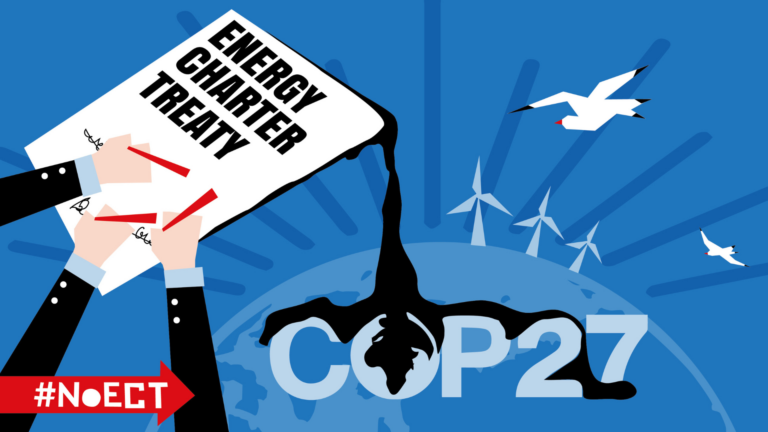Governments should remove the threat of ISDS to climate goals
As the UN climate conference COP 27 is in full swing, over 350 organisations in more then 60 countries call(opens in new window) on governments to commit to remove the threat that ISDS poses to climate goals by getting rid of this unjust and dangerous system.
Many trade and investment agreements include ISDS mechanisms. ISDS empowers transnational corporations to sue governments in secretive tribunals outside of the national legal system over law and policy changes that they fear could reduce their profits.
For many years, oil, gas, mining, extractives and energy corporations have brought hundreds of ISDS cases against countries – energy and mining cases make up 42% of known ISDS cases[1]. Now there are an increasing number of cases that directly challenge climate policy. Fossil fuel corporations are already suing over coal phase out, the cancellation of a tar sands oil pipeline, a ban on offshore oil drilling and fracking regulation. Industry insiders themselves expect these cases may be only a foretaste, given the scale of fossil fuel ‘stranded assets’[2].
This year’s IPCC report was clear that ISDS risks blocking the phase out of fossil fuels[3]. It specifically highlights the Energy Charter Treaty (ECT), which many of the fossil fuel corporations are using and which developing countries are currently being pushed to join.
The key risks from ISDS for tackling the climate crisis are:
-
Increasing the cost of climate action
Corporations can claim vast amounts of taxpayer money through ISDS, often far higher than in domestic courts. Claims in recent climate cases have been in the billions, and they often include a large amount for hypothetical future profits. This surpasses the ability of many countries to pay, making the climate transition unaffordable.
-
Regulatory chill
The fear of being sued may cause countries to delay or decide against taking action that is needed on climate. Countries have already admitted that this is happening.[4] The threat of ISDS can be used to bully governments into backing down. After decades of inaction, the world simply cannot afford fossil fuel companies using ISDS to sue the world into climate paralysis.
Communities at the frontlines of the climate crisis are often at the heart of ISDS claims through struggles against destructive mining and other extractive projects.
We must urgently get rid of the ISDS system. The evidence of years of damage to the environment, land, health and self-determination of peoples all around the world is stark, and the renewed urgency of the climate imperative is beyond doubt. Reform proposals are weak, ineffective and totally inadequate for what is needed. Governments must take immediate action to put an end to the risks of ISDS.
We know this can be done, because some countries have started doing so. Countries such as South Africa, India, New Zealand, Bolivia, Tanzania, Canada and the US have all taken steps toward getting rid of ISDS.
Practical options for action include:
-
Stop:
-
-
negotiating, signing or ratifying any new agreements that include ISDS, such as EU deals with Mexico and Chile
-
joining existing agreements that include ISDS, such as the ECT (Energy Charter Treaty), CETA (Comprehensive Economic and Trade Agreement) or CPTPP (Comprehensive and Progressive Agreement for Trans-Pacific Partnership)
-
extending existing agreements to include ISDS, such as RCEP (Regional Comprehensive Economic Partnership) or AfCFTA (African Continental Free Trade Area)
-
-
-
Terminate or exit existing agreements with ISDS, such as the ECT
-
Withdraw from, and withhold consent to, the use of ISDS
-
Explore alternatives to ISDS including investment risk insurance, international collaboration to strengthen domestic legal systems, and human rights mechanisms
Do you need more information?
-

Bart-Jaap Verbeek
Researcher
Related content
-
COP27: EU adoption of a “modernised” Energy Charter Treaty would open door to more climate chaosPosted in category:Opinion
 Bart-Jaap VerbeekPublished on:
Bart-Jaap VerbeekPublished on: Bart-Jaap Verbeek
Bart-Jaap Verbeek -
 The Netherlands wants to exit Energy Charter TreatyPosted in category:News
The Netherlands wants to exit Energy Charter TreatyPosted in category:News Bart-Jaap VerbeekPublished on:
Bart-Jaap VerbeekPublished on: -
 Urgent call to the Dutch government: exit the Energy Charter Treaty nowPosted in category:News
Urgent call to the Dutch government: exit the Energy Charter Treaty nowPosted in category:News Bart-Jaap VerbeekPublished on:
Bart-Jaap VerbeekPublished on: -

-
Pull the plug on the Energy Charter TreatyPosted in category:Opinion
 Bart-Jaap VerbeekPublished on:
Bart-Jaap VerbeekPublished on: Bart-Jaap Verbeek
Bart-Jaap Verbeek -
 Coal company sues the Netherlands over controversial investment treatyPosted in category:NewsPublished on:
Coal company sues the Netherlands over controversial investment treatyPosted in category:NewsPublished on: -
 Busting the myths around the Energy Charter TreatyPosted in category:News
Busting the myths around the Energy Charter TreatyPosted in category:News Bart-Jaap VerbeekPublished on:
Bart-Jaap VerbeekPublished on: -

-

-


